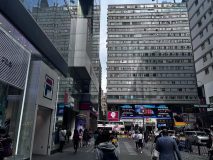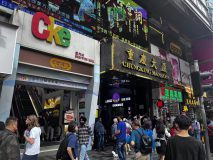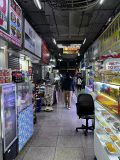The exterior of Chongqing Mansion


The interior of Chongqing Mansion

Link to the Podcast: https://www.youtube.com/watch?v=iF0RVRTot-U
Field Report Transcript
Yutao Xie: Good morning or evening, wherever you are, welcome to our podcast today on architecture and film. We’re your hosts today and I’m Yutao Xie.
Jason Zhu: And I’m Jason Zhu Today We will be talking about the film Chungking Express. I’m sure most of you are no stranger to this film, and many of the classic lines are even more popular.
Kexu Chen: That’s right, my favourite line in the movie is: “Every day, there are opportunities to pass someone by, and you know nothing about them. However, sometimes you become friends and confidants”
Yutao Xie: Although famous, we felt that a short introduction to the film was necessary. Chungking Forest is an urban fashion film directed by Wong Kar-wai and was released in Hong Kong on 14 July 1994. The film focuses on two love stories: one is an urban encounter between a lost cop and a mysterious female assassin, and the other is the love story between patrolman 663 and a girl from a fast food restaurant.
Jason Zhu: Another point worth making when it comes to this film is that of director Wong Kar-wai. Wong Kar-wai is one of the most distinguished directors in Chinese cinema. His film style is very unique. Known for his intensely personal and deeply emotional portrayals. His cinematic works deeply express the inner world of his characters and prominently express emotions. And he conveys a strong sense of mood through his use of a range of tones and symbols.
Kexu Chen: We will come back to the directing style later. Now, follow our introduction to the first love story in the film. Takeshi, a policeman, is in the midst of a breakup. One day, he crosses paths with a blonde woman on the street who is an assassin. 56 hours later, the two meet by chance in a bar and spend a night together. On the morning when Takeshi’s feelings are expected to expire, he receives a birthday wish from the blonde woman: “This moment will never expire. If I had to add an expiration date, I think it would be: 10,000 years.”
Yutao Xie: Through these clips, we can see the building in which the story takes place in the background. This is what we mainly want to analyse today, the Chungking Mansions. Located in Tsim Sha Tsui and completed in 1961, Chungking Mansion is a mixed-use building with many low-cost hotels, shops, restaurants, foreign exchange shops and other service businesses. It is the budding of Hong Kong romantic films and a classic of Hong Kong literary films. From Victoria Harbor to Chungking Mansions on Milton Road, you just need to walk through a busy underpass and walk for about ten minutes.
Jason Zhu: If you look at it from the outside, you may think it will be a relatively tall building but the chaos inside will also give people an invisible pressure, because there are about 4000 people in the building. Some people will compare this building to “Kowloon Walled City of Hong Kong’s ethnic minorities”, which is an alternative international landmark with local characteristics.
Kexu Chen: Through Wong Kar-wai’s films, Chungking Mansions seems to have become a symbol of ambiguity and romance, has become a pilgrimage site for countless petty bourgeois men and women. But is this really the case? To find out, we went to Chungking Mansions and took photos. This is the external environment of the building. And this is internal.
Yutao Xie: It is possible that looking at the photos does not give enough detail. The real-life Chongqing Forest is completely different from the film. In the bustling shops, almost all the people coming and going are South Asian faces, and most sell curries and electronic products. This is a paradise for backpackers and Indian South Asians. People of more than 120 nationalities live here, and it is full of cheap shops, fast food restaurants, and other service industries. It can be described as a mixed bag. But some people say that this is the best place to reflect Hong Kong’s inclusive and orderly multicultural characteristics.
Jason Zhu: In brief, the stinky smell and the chaotic arrangement are far from the romantic atmosphere of the fantasy movie, but it does have a bit of the chaotic atmosphere of the Hong Kong movie when the chase is launched. Because of this movie, the relevant departments have also improved security management. The security of Chungking Mansions has improved, and it will not be as chaotic as before. Now Chungking Mansions is also a holy place for backpackers.
Kexu Chen: So why did the director create such an image of the setting? We believe that this can be analysed in several different ways. The main focus of the film is on the lonely individual in the bustling city, showing the lack of emotion. The city may seem very prosperous, but there will always be a dark corner to show the city’s previous sense of gap. Maybe you can’t touch it, but there must be. Similarly, director Wong Kar-wai’s film style is continued and further developed. These bring a sense of disorientation, ambiguity and fantasy, and reflect the psychological distance between people, the inner disconnection, the lack of security and the sense of alienation.
Yutao Xie: By expressing the tightness of the building distance, it contrasts the distance between people. The sense of alienation between people in the city and the estrangement brought by the steel forest to interpersonal communication, the time and space distance between each other may be close at hand, but the distance between hearts is far away. “Every day you have the opportunity to pass by everyone. You may know nothing about them, but they may become your confidant or friend in the future.”
Jason Zhu: In the film, the director sets the little people in the city as symbols, with no names but code names, and ambiguous identities, which reflect the insignificance of urban people in the steel forest, and also refer to the entire group through the characters in the play. Therefore, the characters shown in the film are also the portrayal of all the characters in urban life. The uneasiness, loneliness and displacement in the heart are the common characteristics of this group, which is in line with the characteristics of the residents of Chungking Mansions.
Kexu Chen: Apart from “Chongqing Forest”, there is no other Hong Kong film here to talk about love, but Chungking Mansions is engraved in everyone’s heart and has become synonymous with Hong Kong films. Perhaps this is the uniqueness of Wong Kar-wai, who is willing to let his ambiguous feelings grow in an unclean place. Although it is located in a busy city, Chungking Mansions seems to wander outside the city. Many Hong Kong people can’t tell the splendor of Chungking Mansions, and mainlanders are relatively unfamiliar with it, but it is very famous for foreign tourists.
Yutao Xie: When we were there, we saw that people come and go in the lobby of the building every day, people with yellow, white and black skin can be seen everywhere, and it is extremely lively: some of them are big entrepreneurs in Africa, transporting containers of cloth and garments back to China more are locals and foreigners living in Chongqing Mansions… There are always stories going on here. Although fish and dragons are mixed, some of the warm tones in the cool tones that appear in the movie also give the building warmth under the darkness, Just as where there is light there is darkness, so where there is darkness there must also be light.
Jason Zhu: “I like watching movies, and I think the narrative method of movies is somewhat similar to that of architecture. They both use spatial techniques to interpret stories. Although movies are presented visually, the transformation and connection from one space to another is like building a house, focusing on telling the story through space and scenes.” Ultimately we would like to say that, against the backdrop of the collective decline of Hong Kong commercial films, the voice of “Hong Kong films are dead” is booming. However, Hong Kong film is not only a commercial film, it is also the world of literary and artistic films, and this city is the best witness.
All: That’s all for this podcast, thanks to all of you for listening.
Yutao Xie(UID: 3036106525)
Jiazhang Zhu(UID: 3036102048)
Kexu Chen(UID:3036104371)
The discussion provides informative background on the film, the director and the place of narrative – Chungking Mansions. Good observation during your field trip and you are able to reveal the social conditions and architectural characteristics of Chungking Mansions in your analysis.
However, your analysis is lack of interconnectedness in elaborating how the architecture supports the narratives of the film. You may also want to improve the conversational qualities of the discussion to engage audiences to your verbal discussion. It is also important to ensure consistency in expressing critical terms in an academic submission, please note that ‘Chungking Express’ is the name of the film instead of ‘Chungking Forest’.